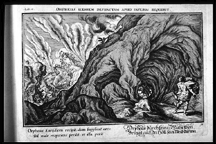

The Story of Orpheus and Eurydice
With dread these inauspicious signs were view'd,
And soon a more disastrous end ensu'd;
For as the bride, amid the Naiad train,
Ran joyful, sporting o'er the flow'ry plain,
A venom'd viper bit her as she pass'd;
Instant she fell, and sudden breath'd her last.
When long his loss the Thracian had deplor'd,
Not by superior Pow'rs to be restor'd;
Inflam'd by love, and urg'd by deep despair,
He leaves the realms of light, and upper air;
Daring to tread the dark Tenarian road,
And tempt the shades in their obscure abode;
Thro' gliding spectres of th' interr'd to go,
And phantom people of the world below:
Persephone he seeks, and him who reigns
O'er ghosts, and Hell's uncomfortable plains.
Arriv'd, he, tuning to his voice his strings,
Thus to the king and queen of shadows sings.
Ye Pow'rs, who under Earth your realms extend,
To whom all mortals must one day descend;
If here 'tis granted sacred truth to tell:
I come not curious to explore your Hell;
Nor come to boast (by vain ambition fir'd)
How Cerberus at my approach retir'd.
My wife alone I seek; for her lov'd sake
These terrors I support, this journey take.
She, luckless wandring, or by fate mis-led,
Chanc'd on a lurking viper's crest to tread;
The vengeful beast, enflam'd with fury, starts,
And thro' her heel his deathful venom darts.
Thus was she snatch'd untimely to her tomb;
Her growing years cut short, and springing bloom.
Long I my loss endeavour'd to sustain,
And strongly strove, but strove, alas, in vain:
At length I yielded, won by mighty love;
Well known is that omnipotence above!
But here, I doubt, his unfelt influence fails;
And yet a hope within my heart prevails.
That here, ev'n here, he has been known of old;
At least if truth be by tradition told;
If fame of former rapes belief may find,
You both by love, and love alone, were join'd.
Now, by the horrors which these realms surround;
By the vast chaos of these depths profound;
By the sad silence which eternal reigns
O'er all the waste of these wide-stretching plains;
Let me again Eurydice receive,
Let Fate her quick-spun thread of life re-weave.
All our possessions are but loans from you,
And soon, or late, you must be paid your due;
Hither we haste to human-kind's last seat,
Your endless empire, and our sure retreat.
She too, when ripen'd years she shall attain,
Must, of avoidless right, be yours again:
I but the transient use of that require,
Which soon, too soon, I must resign entire.
But if the destinies refuse my vow,
And no remission of her doom allow;
Know, I'm determin'd to return no more;
So both retain, or both to life restore.
Thus, while the bard melodiously complains,
And to his lyre accords his vocal strains,
The very bloodless shades attention keep,
And silent, seem compassionate to weep;
Ev'n Tantalus his flood unthirsty views,
Nor flies the stream, nor he the stream pursues;
Ixion's wond'ring wheel its whirl suspends,
And the voracious vulture, charm'd, attends;
No more the Belides their toil bemoan,
And Sisiphus reclin'd, sits list'ning on his stone.
Then first ('tis said) by sacred verse subdu'd,
The Furies felt their cheeks with tears bedew'd:
Nor could the rigid king, or queen of Hell,
Th' impulse of pity in their hearts repell.
Now, from a troop of shades that last arriv'd,
Eurydice was call'd, and stood reviv'd:
Slow she advanc'd, and halting seem to feel
The fatal wound, yet painful in her heel.
Thus he obtains the suit so much desir'd,
On strict observance of the terms requir'd:
For if, before he reach the realms of air,
He backward cast his eyes to view the fair,
The forfeit grant, that instant, void is made,
And she for ever left a lifeless shade.
Now thro' the noiseless throng their way they bend,
And both with pain the rugged road ascend;
Dark was the path, and difficult, and steep,
And thick with vapours from the smoaky deep.
They well-nigh now had pass'd the bounds of night,
And just approach'd the margin of the light,
When he, mistrusting lest her steps might stray,
And gladsome of the glympse of dawning day,
His longing eyes, impatient, backward cast
To catch a lover's look, but look'd his last;
For, instant dying, she again descends,
While he to empty air his arms extends.
Again she dy'd, nor yet her lord reprov'd;
What could she say, but that too well he lov'd?
One last farewell she spoke, which scarce he heard;
So soon she drop'd, so sudden disappear'd.
All stunn'd he stood, when thus his wife he view'd
By second Fate, and double death subdu'd:
Not more amazement by that wretch was shown,
Whom Cerberus beholding, turn'd to stone;
Nor Olenus cou'd more astonish'd look,
When on himself Lethaea's fault he took,
His beauteous wife, who too secure had dar'd
Her face to vye with Goddesses compar'd:
Once join'd by love, they stand united still,
Turn'd to contiguous rocks on Ida's hill.
Now to repass the Styx in vain he tries,
Charon averse, his pressing suit denies.
Sev'n days entire, along th' infernal shores,
Disconsolate, the bard Eurydice deplores;
Defil'd with filth his robe, with tears his cheeks,
No sustenance but grief, and cares, he seeks:
Of rigid Fate incessant he complains,
And Hell's inexorable Gods arraigns.
This ended, to high Rhodope he hastes,
And Haemus' mountain, bleak with northern blasts.